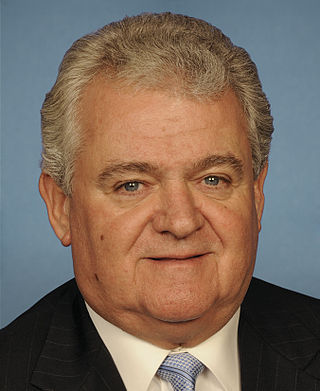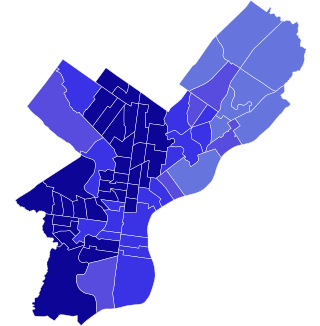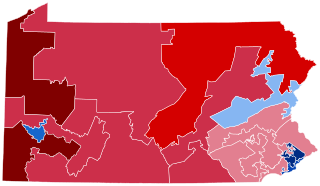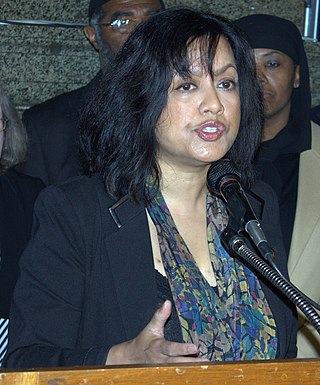
John Franklin Street is an American politician and lawyer who served as the 97th Mayor of the City of Philadelphia. He was first elected to a term beginning on January 3, 2000, and was re-elected to a second term beginning in 2004. He is a Democrat and became mayor after having served 19 years in the Philadelphia City Council, including seven years as its president, before resigning as required under the Philadelphia City Charter in order to run for mayor. He followed Ed Rendell as mayor, assuming the post on January 3, 2000. Street was Philadelphia's second black mayor.

Francis Lazarro Rizzo was an American police officer and politician. He served as commissioner of the Philadelphia Police Department (PPD) from 1968 to 1971 and mayor of Philadelphia from 1972 to 1980. He was a member of the Democratic Party throughout the entirety of his career in public office. He switched to the Republican Party in 1986 and campaigned as a Republican for the final five years of his life.

Robert A. Brady is an American politician who served as the U.S. representative for Pennsylvania's 1st congressional district from 1998 to 2019. He was the ranking Democrat and Chairman of the United States House Committee on House Administration from 2007 to 2019. He has served as Chairman of the Philadelphia Democratic Party for more than 35 years and is a registered lobbyist for NBC Universal and Independence Blue Cross.

William Joseph Green III is an American politician from Pennsylvania. A Democrat, Green served in the U.S. House of Representatives from 1964 to 1977 and as the 94th Mayor of Philadelphia from 1980 to 1984.

Catherine Baker Knoll was an American politician and member of the Democratic Party. She was the 30th lieutenant governor of Pennsylvania, serving under Governor Ed Rendell from 2003 to 2008, when she died in office. Prior to that, she served as the 72nd Pennsylvania treasurer from 1989 to 1997. She was the first, and to date, the only woman to be lieutenant governor of Pennsylvania.
Barbara Hafer is an American politician and convicted felon from the Commonwealth of Pennsylvania. She served as a member of the Allegheny County Board of Commissioners from 1984 to 1989, as the Auditor General of Pennsylvania from 1989 to 1997 and as the Treasurer of Pennsylvania from 1997 to 2005.

Joseph Francis Smith, was an American politician from Pennsylvania who served as a Democratic member of the United States House of Representatives for Pennsylvania's 3rd congressional district from 1981 to 1983. He served as Chairman of the Philadelphia Democratic City Committee from 1983 to 1986 and as a member of the Pennsylvania State Senate for the 4th district from 1971 to 1981.

The 2008 congressional elections in Pennsylvania was held on November 4, 2008, to determine who will represent the state of Pennsylvania in the United States House of Representatives. Pennsylvania has 19 seats in the House, apportioned according to the 2000 United States census. Representatives are elected for two-year terms; those elected will serve in the 111th Congress from January 4, 2009, until January 3, 2011. The election coincides with the 2008 U.S. presidential election.

The 2010 United States Senate election in Pennsylvania took place on November 2, 2010, during the 2010 midterm elections. Incumbent Republican-turned-Democrat U.S. Senator Arlen Specter ran for reelection to a sixth term, but lost in the Democratic primary to Joe Sestak. Republican nominee Pat Toomey then won the seat.

The 2004 United States Senate election in Pennsylvania was held on November 2, 2004. Incumbent Republican U.S. Senator Arlen Specter won re-election to a fifth term. As of 2024, this is the last time a Republican statewide candidate won Montgomery and Delaware Counties and won more than 25% of the vote in Philadelphia.
The Shame of a City is a 2006 feature-length documentary directed by Tigre Hill about the final month of the 2003 Philadelphia Mayoral Election. During that election, incumbent Democrat John Street sought to defeat his Republican challenger Sam Katz. Philadelphia is predominantly Democratic, but early polls showed Katz with a small lead. Twenty-seven days prior to the election, the FBI revealed that it was investigating Street for corruption, but polls showed that the public supported Street more after the scandal broke. Hill attempts to investigate how Street turned the corruption scandal into an advantage.

The 1994 Pennsylvania gubernatorial election was held on November 8, 1994. The incumbent governor, Bob Casey, Sr. (Democrat), was barred from seeking a third term by the state constitution. The Republican Party nominated Congressman Tom Ridge, while the Democrats nominated Mark Singel, Casey's lieutenant governor. Ridge went on to win the race with 45% of the vote. Singel finished with 39%, and Constitution Party candidate Peg Luksik finished third, garnering 12% of the vote.

The 1962 Pennsylvania gubernatorial election was held on November 6. Republican Bill Scranton and Democrat Richardson Dilworth, each a member of a powerful political family, faced off in a bitter campaign.

The 2015 Philadelphia mayoral election was held on November 3, 2015, to elect the Mayor of Philadelphia, Pennsylvania, concurrently with various other state and local elections. Heavily favored Democratic party candidate Jim Kenney won.

The 2016 United States House of Representatives elections in Pennsylvania were held on November 8, 2016, to elect the 18 U.S. representatives from the Commonwealth of Pennsylvania, one from each of the state's 18 congressional districts. The elections coincided with the 2016 U.S. presidential election, as well as other elections to the House of Representatives, elections to the United States Senate and various state and local elections. The primaries were held on April 26.

The 2018 Pennsylvania gubernatorial election took place on November 6, 2018, to elect the Governor and Lieutenant Governor of Pennsylvania, concurrently with the election of Pennsylvania's Class I U.S. Senate seat, as well as elections to the United States House of Representatives and various local elections. Incumbent Governor Tom Wolf won re-election to a second term by a double-digit margin, defeating Republican challenger Scott Wagner and two third-party candidates from the Green Party, Paul Glover and Libertarian Party, Ken Krawchuk. The primary elections were held on May 15. This was the only Democratic-held governorship up for election in 2018 in a state Donald Trump won in the 2016 presidential election.

The 2022 United States Senate election in Pennsylvania was held on November 8, 2022, to elect a member of the United States Senate to represent the Commonwealth of Pennsylvania. Democratic lieutenant governor John Fetterman won his first term in office, defeating Republican surgeon Mehmet Oz. Fetterman succeeded incumbent Republican senator Pat Toomey, who did not seek re-election after two terms. This was the only U.S. Senate seat to flip parties in the 2022 midterms.

The 2022 Pennsylvania gubernatorial election was held on November 8, 2022, to elect the governor of Pennsylvania and lieutenant governor of Pennsylvania. State Attorney General Josh Shapiro defeated State Senator Doug Mastriano by 14.8 percentage points to succeed term-limited incumbent governor Tom Wolf (D). Primaries were held on May 17, 2022. Shapiro won the Democratic nomination after running unopposed and Mastriano won the Republican nomination with 44% of the vote. Mastriano's nomination drew attention due to his far-right political views.

The Pennsylvania Auditor General election of 2020 took place on November 3, 2020. Primary elections were originally due to take place on April 28, 2020. However, following concerns regarding the coronavirus pandemic the primaries were delayed until June 2, 2020. Under the Pennsylvania Constitution incumbent Democratic Auditor General Eugene DePasquale was ineligible to seek a third consecutive term.

Isadore Harry Bellis was a Democratic politician in Philadelphia. Known in his youth as a tennis star, he later became a successful lawyer and entered politics. He was elected to the Philadelphia City Council in 1963 and served there for three terms, rising to become majority leader in 1972.


















